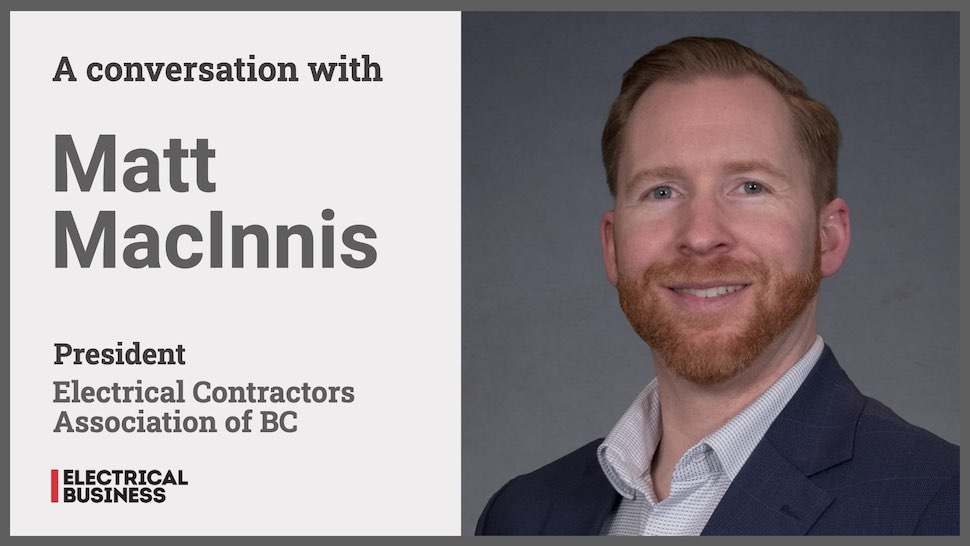
Articles
Features
Articles
British Columbia needs ECABC members – A conversation with Matt MacInnis
February 13, 2023 | By Anthony Capkun
 Source: ECABC
Source: ECABCFebruary 13, 2023 – If you’ve not yet met Matt MacInnis, consider this your official introduction to the new president of the Electrical Contractors Association of BC.
We caught up with MacInnis to learn about the state of things in British Columbia (electrically, of course), and ECABC’s priorities in the coming years.
EBMAG: Matt, upon being named ECABC president, you were quoted: “I believe it’s important that we recognize the critical role of electrical contractors in supporting key priorities of British Columbians”. Tell me about some of those priorities, and electrical contractors’ critical role.
MACINNIS: When it comes to British Columbia, two of the biggest topics are housing and climate change, and the work of electrical contractors is really fundamental to both.
Without being overly simplistic, there isn’t a single home that will be built in British Columbia without the assistance of electrical contractors.
The world is changing, trying to increase its use of electricity over fossil fuels, and British Columbia is leading the way. A new home being built today may have an electric vehicle charger, which was unheard of 10 years ago. We’re seeing a bigger switch, particularly in the Lower Mainland and the larger municipalities, with regard to heating systems based on electricity rather than fossil fuels. And smart homes are more energy-efficient than ever before, incorporating elements that didn’t exist five, 10, 15 years ago.
When it comes to climate change, British Columbia’s strategy is based almost entirely on electrification, whether for transportation, heavy industry, or our buildings; and all of these new technologies are going to require an electrical contractor. On the electric vehicles side alone, the work of installing and maintaining that EV infrastructure comes down to electrical contractors… not to mention all the electricity generation and transmission work that’s needed to ensure we can achieve our climate goals.
Again, this involves ECABC members and their skilled workers, who will be enhancing grid capacity, dealing with EV supply equipment, bolstering BC’s overall electric capabilities, and generally ensuring that our buildings and infrastructure can handle this increased load.
EBMAG: British Columbia is moving ahead with skilled trades certification. To quote you again: “BC’s electrical contractors believe that all electrical work should be completed by appropriately trained electrical journeypersons and apprentices. The important next steps are to increase the number of apprentices being trained to meet current and future demand, and ensure we are supporting electrical apprentices through to completion”. Tell us about this.
MACINNIS: There’s a very big need to align the “big picture” goals of government in British Columbia—climate change, availability and affordability of housing—and the number of electrical workers. I worry a little that there may be a bit of a gap between their top-line ambitions and what’s actually needed in terms of boots on the ground to get it done.
Between now and the near- to medium-term future, we want to see increased investment in the trades training system, with a really strong focus and emphasis on enhancing the number of electrical apprentices, while simultaneously better supporting apprentices who are currently in the system.
EBMAG: What are ECABC’s top priorities in the coming years?
MACINNIS: The really big policy piece for us is prompt payment legislation. When I speak to people outside of our industry about it, they tend to look at me in confusion; they can’t understand how this could possibly still be an issue in 2023.
Ontario has had prompt payment legislation for a number of years, and Alberta recently passed it. Here in BC, however, contractors of all sizes are essentially financing significant portions of their projects. That’s not fair. It’s not right.
There’s no logical reason why a contractor in BC should have to wait 60, 90, 120 days to get paid for work that’s been completed. We’d like the government to take action soon to provide fairness and protection for BC workers.
We’re working alongside other construction associations—like the BC Construction Association and the Mechanical Contractors Association of BC to encourage government to pass prompt payment legislation as soon as possible.
EBMAG: Now, I believe you wanted to mention something about an apprenticeship program?
MACINNIS: Yes, thanks. BCCA has received funding from the Government of Canada to provide financial incentives to construction employers for hiring and registering first-year apprentices in 39 Red Seal trades, which includes Electrical (construction and industrial, and also powerline technician).
I encourage contractors who are thinking about taking on apprentices to check out BCCA’s program.
EBMAG: In closing, Matt, tell me why an electrical contractor should be an ECABC member.
MACINNIS: Being a member provides you with many benefits, including the opportunity to network with industry leaders at our events, discounts on industry publications, industry and government updates and more.
I think there is real value is in our education and training programs, and gaining the ability to contribute to the voice of the electrical industry through the association’s advocacy effort.
Our voice is stronger when electrical contractors stand together, and that helps tremendously when we’re working with government to create an environment that supports the long-term health and viability of electrical contractors, as well as British Columbia’s overall construction sector.
You’ll find all Back Issues of Electrical Business Magazine in our Digital Archive.
Print this page
